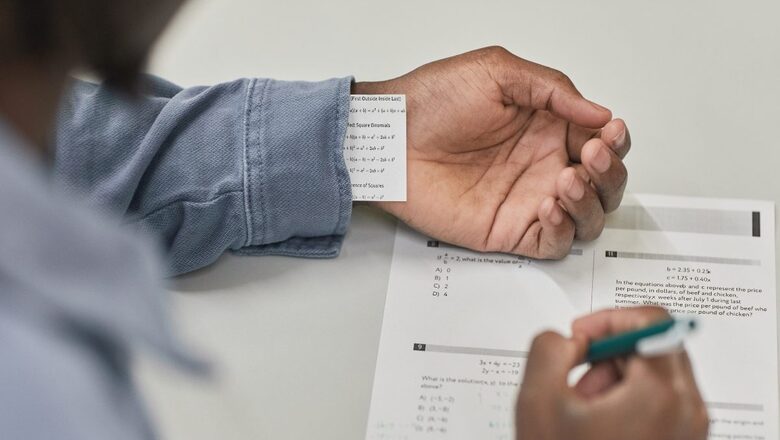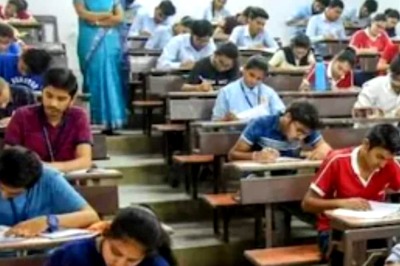
views
A student who was caught with a mobile phone in an examination hall was condoned by a prestigious south Mumbai college, run by the Jesuits, some days ago. This boy was under treatment for depression and also had symptoms of autism. The principal of this college reached out to the psychiatrist who gave a detailed understanding of the student’s problem. After serious perusal with the teachers, the student was pardoned. The 18-year-old was not humiliated, nor given long pedantic moral science lessons or threatened or intimidated. Instead, his counselling process was strengthened. This approach with every student in such circumstances is the need of the hour.
On the contrary, in a school in south Mumbai owned by a senior politician, where three seventh-grade students were caught smoking in the washroom, they were forcibly evicted some time back. When a senior mental health professional requested the school to view this event sensitively, he was told to mind his own business and not interfere in the school’s affairs.
Death by self-harm a few days ago on a Bangalore college campus after being caught copying has also raised many issues. In my experience across three decades, many students have lost their lives due to self-harm after being caught cheating because the educational institutions and families did not know how to handle them. The word that passes through the mental screens then is — ‘cheating is a crime’. I still remember an incident where two spirited teachers ran on the road to save a student who threatened to end his life a decade ago, after being hauled for taking chits in his tests. The lad was saved after his family, along with him, received mental health support. He turned around and never repeated the act again.
In the 21st century, educational institutions need to change their narratives and initiate the following changes when students are caught ‘cheating’.
A Paradigm Shift Is A Must
While viewing the behaviour of students, one needs to shed the discipline/indiscipline paradigm. With this norm, discipline is understood as adhering to the strict norms and rules of the college and family. Indiscipline is when the desired or stated norms are violated and this is viewed as an offence to be punished. Copying is viewed as betrayal where the reputation of the family or the institution is tarnished. The mindset here is feudal, retrograde and medieval. The belief system here states that copying is like a theft that undermines the value systems of the individuals, family and the organisation. The ethics here divides behaviours as black or white where there is no scope for looking at the nuances of the difficult behaviours. The fears are that the entire functioning of the school will be undermined and will lead to chaos if this blueprint is not adhered to. The grey between black and white is never recognised. The moral compass here is coloured with principles of righteousness alone.
The shift in the value systems today is that the acts of students need to be viewed as appropriate/inappropriate. Appropriate ones should be rewarded and the inappropriate ones need to be corrected and counselled, though the administrative actions may not be avoided. This model looks at actions, not with a standard prism, but on a case-by-case basis. Here the system is against the behaviour and not against the person. Shock, shame and fear among students, when discovered, lead to self-harm. In this era, the minds of many learners are very brittle, thanks to the adverse effects of rapid social change, and globalisation that has also led to angst, alienation, shrinking emotional contact time with loved ones and mental health problems This state of affairs is largely not understood by authorities in the temples of learning.
When a student is caught copying
The teacher may get upset, angry and livid. S/he may feel like scolding or shouting and may behave harshly. S/he may also feel let down and betrayed by the student. Let the feelings and thoughts pass through the screen of the mind as staying calm is vital. This behaviour is not a failure on behalf of the teacher, parents or the institution. It is an aberration and an inappropriate act that needs to be addressed. Let the boy or the girl be gently escorted to a safe place in the college and be respectfully made to sit. Snacks and tea/coffee may be served. One is against the behaviour, not him/her. Let the student gently share his side of the story. An inquiry team by a committee of teachers, parents and a human rights activist is desirable. Instant judgement should never be pronounced.
If the conduct is confirmed, a psychologist should be arranged to talk to the boy or the girl. The professional will engage in deep listening and calming down the student. Let the student be there with the psychologist for enough time as deemed necessary. In the absence of a counsellor, empowered teachers working in pairs should be assigned the job. The parents then need to be called and explained sensitively that their son/daughter has met with an emotional accident. Copying is an emotional accident just like that on roads due to acts of omission like not being alert or acts of commission such as errant driving. The shock, grief, and pain of parents would take some time to settle down but a good beginning is necessary.
The body language of the authorities should be respectful and compassionate towards the family and the student. This is not easy but if the teachers in the college undergo mental health drills just like repeated fire drills during peace times to wire the brain with the necessary software, then the approach will be pragmatic, reassuring and positive. If the parents are from a different city, then the safety and care of the student is of the institute and s/he should be in the confines of a safe place such as a mental health centre or any other till the parents come. In many cases, the college and the parents indulge in a futile war of words against each other. Even if the parents are available and there is a fear of self-harm in the student or the parents, a similar approach needs to be carried about. If a student is appearing in a different centre, the college where the examination is held and the parent college should join hands to assist both the family and the student. The psychologist assigned should take charge of the entire family and be supported by the college completely till they all reasonably settle down. This may take time days, weeks or months.
Teachers working with mental health professionals hasten healing. Sensitive peers of the student and sensible extended family members can provide critical support too. Families and institutes should function as a joint family to treat this emotional accident. This approach is not about being lenient or indulgent but it operates from the belief systems that no student is born a criminal and transformation is possible in every learner. The administrative action that the college or the university has as a norm may be implemented after taking all factors into consideration to help the learner understand the consequence of his actions. It may be decided on a case-to-case basis. No undue favour, irrational benevolence or destructive action should be displayed out of pressure from any corner to any student.
Mental Health Policy
Every educational institute needs to spell out a mental health policy for the entire organisation that includes all stakeholders. Such a policy needs to be inclusive and adhere to the principles of human rights and the law of the land. Schools and colleges are not only edifices of learning but also correctional centres where difficult behaviours are treated with respect, compassion and science.
It’s time that teachers and parents view issues such as copying and others as challenges and opportunities to help learners turn around and become effective, holistic and productive human beings.
Dr Harish Shetty is Psychiatrist who has been working with students for the last three decades. He visits and conducts mental health workshops in educational institutes regularly with all stakeholders. Views expressed in the above piece are personal and solely that of the author. They do not necessarily reflect News18’s views.




















Comments
0 comment